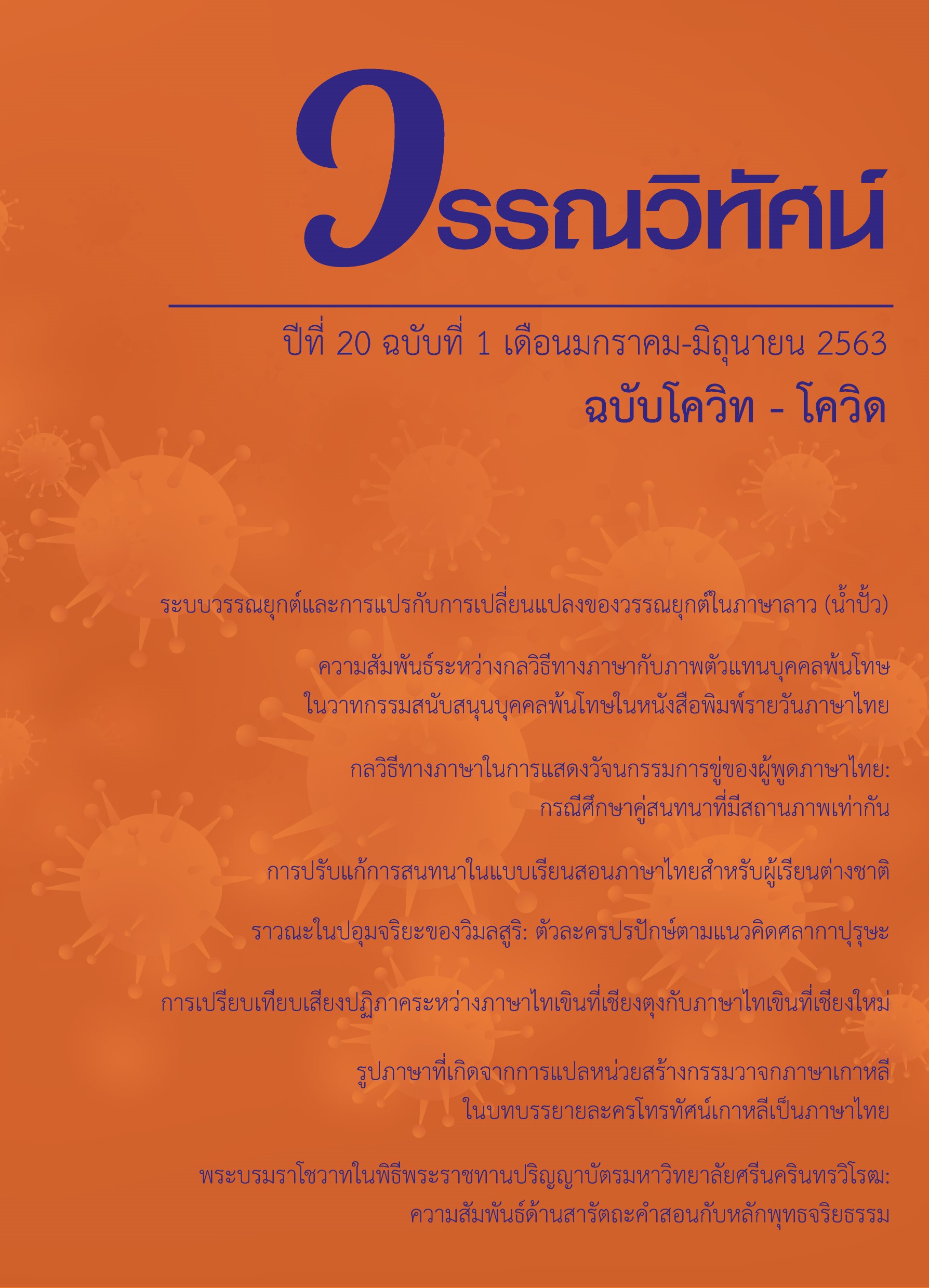The Speech in Graduation Ceremony Given at Srinakharinwirot University: The Relationship of its Essentials and Ethics of Buddhism.
Main Article Content
Abstract
This research study examined the Essentials of the speech in graduation ceremony given at Srinakharinwirot University, in particular, the categories of the Essentials, and the relationship between the Essentials and Buddhist Ethics. The results of the research revealed that the Essentials could be divided into four categories as follows: 1) the Essentials related to the graduates, 2) the Essentials related to Professionalism, 3) the Essentials related to the code of ethics for teachers, and 4) the Essentials related to Education. Regarding the relationship between the Essential and Buddhist Ethics, it was found that the Essentials are related to two principles of the Attha (or benefit), namely, Attattha- a gain for oneself- and Parattha- a gain for others and the society. Attattha consists of two precepts i.e. Diññhadhammikattha 4 (benefits obtainable here and now) and Samparàyikattha 4 (the good to be won in the life to come), the former of which comprises Utthanasampada (to be endowed with energy and industry), Arukkhasampada (to be endowed with watchfulness), Kalyanamittata (association with good people) and Samajivita (balanced livelihood) while the latter includes saddhà (faith), silà (morality), càgà (charity) and panyà (wisdom). The second gain, Parattha, consists of Gharàvàsadhamma 4 (the Four Virtues of a Good Household Life), Iddhipàda 4 (the Four Bases of Success), Brahmavihàra 4 (the Four Sublime States of Mind), Saïgahavatthu 4 (the Four Bases of Sympathy), Soracca (modesty), Buddhaguõa 3 (the Three attributes of the Buddha), and Mangala (highest blessing)
Article Details
References
คณะกรรมการโครงการประกาศเกียรติคุณ มศว 60 ปี ศรีสง่ามหานคร. (2551). พระบรมราโชวาท พระราโชวาท พระโอวาท พิธีพระราชทานปริญญากิตติมศักดิ์และปริญญาบัตรวิทยาลัยวิชาการศึกษาและมหาวิทยาลัยศรีนครินทรวิโรฒ พุทธศักราช 2502-2551. กรุงเทพฯ: กริดส์ ดีไซน์ แอนด์ คอมมูนิเคชั่น.
พระธรรมกิตติวงศ์ (ทองดี สุรเตโช). (2551). พจนานุกรมเพื่อการศึกษาพุทธศาสน์. (พิมพ์ครั้งที่ 3). กรุงเทพฯ: ธรรมสภาและสถาบันบันลือธรรม.
พระธรรมปิฎก (ป.อ. ปยุตฺโต). (2538). พุทธธรรม. (พิมพ์ครั้งที่ 6). กรุงเทพฯ: มหาจุฬาลงกรณราชวิทยาลัย.
พระธรรมปิฎก (ป.อ. ปยุตฺโต). (2540). หลักทั่วไปของพุทธศาสตร์. กรุงเทพฯ: ธรรมสภา.
พระพรหมคุณาภรณ์ (ป. อ. ปยุตฺโต). (2548). พจนานุกรมพุทธศาสตร์ ฉบับประมวลธรรม. (พิมพ์ครั้งที่ 13). กรุงเทพฯ: เอส. อาร์. พริ้นติ้ง แมส โปรดักส์.
พระพรหมคุณาภรณ์ (ป. อ. ปยุตฺโต). (2559ก). พจนานุกรมพุทธศาสตร์ ฉบับประมวลธรรม. (พิมพ์ครั้งที่ 35). กรุงเทพฯ: มูลนิธิการศึกษาเพื่อสันติภาพ.
พระพรหมคุณาภรณ์ (ป. อ. ปยุตฺโต). (2559ข). พจนานุกรมพุทธศาสตร์ ฉบับประมวลศัพท์. (พิมพ์ครั้งที่ 27). กรุงเทพฯ: มูลนิธิการศึกษาเพื่อสันติภาพ.
โยธิน มาหา. (2547). การศึกษาเชิงวิเคราะห์หลักพุทธจริยธรรมที่ปรากฏในวรรณกรรมของอาจารย์สุชีพ ปุญญานุภาพ ประเภทนวนิยายอิงหลักธรรม. (วิทยานิพนธ์ปริญญามหาบัณฑิต). มหาวิทยาลัยมหิดล, นครปฐม.
อุดม หนูทอง. (2539). บัณฑิตไทยในแนวพระราชดำริ. กรุงเทพฯ: มหาวิทยาลัยวลัยลักษณ์.


